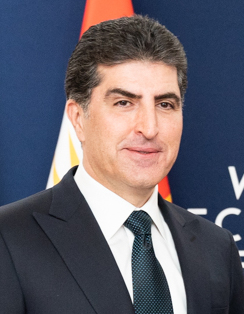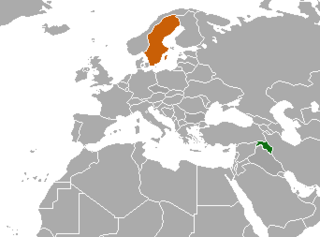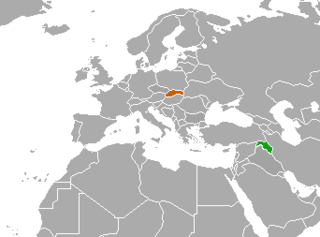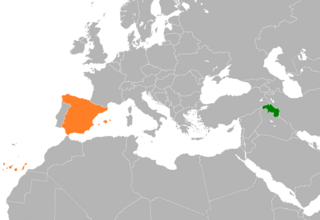Iraqi Kurdistan or Southern Kurdistan refers to the Kurdish-populated part of northern Iraq. It is considered one of the four parts of Kurdistan, which also includes parts of southeastern Turkey, northern Syria, and northwestern Iran. Much of the geographical and cultural region of Iraqi Kurdistan is part of the Kurdistan Region (KRI), an autonomous region recognized by the Constitution of Iraq.

Nechirvan Idris Barzani is a Kurdish politician serving as the second President of the Kurdistan Region. He was elected into office by the Kurdistan Region Parliament in June 2019. Nechirvan Barzani was appointed as Vice President of the Kurdistan Democratic Party since 2010. He previously served as Prime Minister of the Kurdistan Regional Government from March 2007 to August 2009 and March 2012 to May 2019. Nechirvan Barzani is also the founder of the University Of Kurdistan - Hewler, the region's top ranking university.

The Kurdistan Regional Government (KRG) is the official executive body of the autonomous Kurdistan Region of northern Iraq.

The Kurdistan Region is an autonomous region in northern Iraq comprising the four Kurdish-majority governorates of Dohuk, Erbil, Halabja and Sulaymaniyah and bordering Iran, Syria and Turkey. The Kurdistan Region encompasses most of Iraqi Kurdistan but excludes the disputed territories of Northern Iraq, contested between the Kurdistan Regional Government and the central Iraqi government in Baghdad since Kurdish autonomy was realized in 1992 in the aftermath of the Gulf War. The Kurdistan Region Parliament is situated in Erbil, but the constitution of the Kurdistan Region declares the disputed city of Kirkuk to be the capital of the Kurdistan Region. When the Iraqi Army withdrew from most of the disputed areas in mid-2014 because of the ISIL offensive in Northern Iraq, Kurdish Peshmerga entered the areas and held control there until Iraq retook the areas in October 2017.

Masrour Barzani is a Kurdish politician and serving as prime minister of the Kurdistan Region of Iraq since June 2019. He is also the chancellor of the Kurdistan Region Security Council and a member of the Kurdistan Democratic Party. He was sworn in as prime minister of the KRG’s ninth cabinet on 10 July 2019, after receiving 87 votes out of 97 legislators in the Kurdistan parliament.

The Iraqi–Kurdish conflict consists of a series of wars and rebellions by the Kurds against the central authority of Iraq during the 20th century, which began shortly after the defeat of the Ottoman Empire in World War I and lasting until the U.S. invasion of Iraq in 2003. Some put the marking point of the conflict beginning to the attempt by Mahmud Barzanji to establish an independent Kingdom of Kurdistan, while others relate to the conflict as only the post-1961 insurrection by the Barzanis. The conflict lasted until the US invasion of Iraq in 2003, though tensions between the Kurdish autonomy and the central Iraqi government have continued.

The disputed territories of Northern Iraq are regions defined by article 140 of the Constitution of Iraq as being Arabised during Baath Party rule in Iraq. Most of these regions are inhabited by non-Arabs, including Kurds, Assyrians, Yazidis, Turkmens/Turkomans, and Shabaks.

Kurds in Iraq are people born in or residing in Iraq who are of Kurdish origin. The Kurds are the largest ethnic minority in Iraq, comprising between 20% and 25% of the country's population according to the CIA World Factbook.

Human rights in Iraqi Kurdistan refer to the human rights issue in the autonomous area of Kurdistan Region.

Relations of Kurdistan Region of Iraq with foreign states and organizations are conducted by the Kurdistan Region. Political stability and a rapidly developing economy have given the KRG the opportunity to pursue a foreign policy independent from the central government's. The KRG's primary body for directing its foreign affairs is the Department of Foreign Relations (DFR). The DFR's foremost objectives are to raise the global profile of the Kurdistan Region, improve the Region's international ties with various governments and international organizations, and present emerging business opportunities in the Kurdistan Region to regional and international actors.

An independence referendum for Kurdistan Region of Iraq was held on 25 September 2017, with preliminary results showing approximately 92.73 percent of votes cast in favour of independence. Despite reporting that the independence referendum would be non-binding, the autonomous Kurdistan Regional Government (KRG) characterised it as binding, although they claimed that an affirmative result would trigger the start of state building and negotiations with Iraq rather than an immediate declaration of independence of Kurdistan. The referendum's legality was rejected by the federal government of Iraq.

Kurdistan Region–Poland relations are bilateral relations between Kurdistan Region and Poland. Kurdistan Region is represented in Poland through a representation in Warsaw since 2004, while Poland has a consulate general in Erbil since 2012. In 2005, Polish Prime Minister Marek Belka, Foreign Minister Adam Rotfeld, Minister of National Defense Jerzy Szmajdziński and Minister of Culture Waldemar Dąbrowski met Kurdish President Masoud Barzani and Prime Minister Nechirvan Barzani in Erbil and stated their support for the reconstruction of Iraq, including Kurdistan Region.

Kurdistan Region–Sweden relations are bilateral relations between Kurdistan Region and Sweden. Kurdistan Region is represented in Sweden through a representation in Stockholm since 2011, while Sweden has an embassy in Erbil since 2012.

Belgium–Kurdistan Region relations are bilateral relations between Belgium and Kurdistan Region. Belgium has no representation in Kurdistan Region and the latter has no representation in Belgium. Kurdistan Region's representation to the European Union is located in the Belgian capital of Brussels. Belgium has a military presence in Kurdistan Region with circa 30 soldiers training Kurdish soldiers (Peshmerga). In 2017, Kurdish President Massoud Barzani visited Belgium and met with Minister-President Geert Bourgeois of the federal region of Flanders, where the latter stated that the upcoming Kurdish referendum in September 2017 should be respected and Deputy Prime Minister of the federal government in Belgium Jan Jambon has stated that all nations have the right to self-determination.

Kurdistan Region–Slovakia relations are bilateral relations between Kurdistan Region and Slovakia. Kurdistan Region has no representation in Slovakia, and the latter has no representation in Kurdistan Region. Chairman of the Kurdistan Investment Board Herish Muharam visited Bratislava in 2012 to boost economic ties. Muharam met with Slovak Ministry of Foreign and European Affairs, Minister of Economy, the Executive Director of the Slovak Investment and Trade Development Agency, and the Secretary General of the Slovak Chamber of Commerce and Industry.
Bafel Talabani, in Kurdish Bafel Talebanî بافڵ تاڵەبانی is an Iraqi Kurdish politician and an emerging political figure and dealmaker in the Patriotic Union of Kurdistan (PUK). He is the older son of former PUK leader Jalal Talabani.

The 2017 Iraqi–Kurdish conflict, also known as the Kirkuk Crisis, was a conflict in which the Iraqi government retook disputed territories in Iraq which had been held by the Peshmerga since ISIL's Northern Iraq offensive in 2014. The conflict began on 15 October 2017 after tensions arising from the Kurdistan Region independence referendum of 25 September. The tension between the federal Iraqi government and Kurdistan Region escalated into conflict when the Peshmerga ignored repeated warnings to return Kirkuk to Iraqi government forces. Part of the conflict was the Battle of Kirkuk, when Iraqi forces regained control of the city.

Kurdistan Region–Spain relations are bilateral relations between Kurdistan Region and Spain. Kurdistan Region is represented in Spain through a representation in Madrid since 2010, while Spain has no representation in Kurdistan Region. When the Kurdish representation opened in Madrid, the representative Daban Shadala stated that their activities primarily focused on building confidence, trust and friendship between the two parties. These goals were accomplished according to Shadala and Spanish Foreign Minister Jose Garcia-Margallo held a meeting with Deputy Prime Minister of Kurdistan Emad Ahmad which resulted in the opening of a Spanish honorary consulate in Erbil.

Australia–Kurdistan Region relations are bilateral relations between Australia and Kurdistan Region. While Australia has no representation in Kurdistan, Kurdistan has a representative office in Sydney. Moreover, there is a Kurdish lobby in Australia. In late 2014, Australian Prime Minister Tony Abbott authorized the training of the Kurdish soldiers or Peshmerga and also supplied the Kurds with ordnance in September 2014. A C-130J was involved in the airlift of arms and munitions to the Kurdish forces. In April 2016, it was disclosed that an Australian Army Special Operations Task Group personnel were assisting at the "divisional level" embedded with senior Kurdish Peshmerga commanders.

Kurdistan Region–Russia relations are bilateral relations between Kurdistan Region and Russia. While Kurdistan Region has a representation in Moscow, Russia has a consulate general in Erbil which opened on 28 November 2007. Relations between the Kurds and the Russians date back to the second half of the 1800s when Russian interest in Kurds because of expansionist ambitions. During the Cold War, the Soviet Union supported the Kurdish rebels against Iraq until the European power withdrew politically from the Middle East in the late 1970s because of the Middle-Eastern backlash from the Soviet invasion of Afghanistan.
















